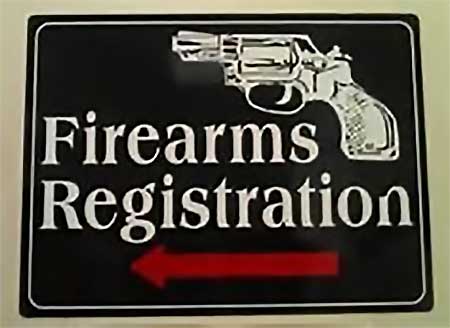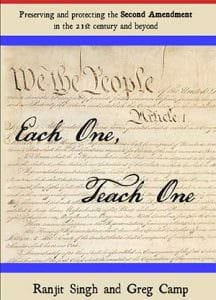by Greg Camp ; Opinion
AmmoLand News welcomes Greg Camp to our list of the best and brightest Second Amendment contributors.


USA – -(Ammoland.com)- One of the endemic notions of gun control advocates that flare up after any violence that grabs the headlines is the proposal that all guns must be registered to their owners.
The idea is that if the government knows which guns are in the hands of what law-abiding Americans, the flow of weaponry to criminals would be stanched.
There are multiple problems with this belief. For one thing, the unstated assumption being made here is that the United States exists in a closed system.
And yet, the explicit statement makes this laughable, given the porous nature of our borders. One example of this are the tons of illegal drugs that enter each year. If our dogs and mechanical sensors can’t keep drugs out, what makes anyone think that we could block machine parts?
Anyone wishing to smuggle in guns would only have to hide them in bales of marijuana.
And the record of registries doesn’t provide hope for their supporters. Canada found that its long-gun registry costs billions of dollars while doing nothing to reduce crime or save lives. A parallel effort at keeping a ballistic database of handguns in Maryland—which is a registry in all but name—also resulted in not one criminal case being solved.
There is also the matter of the number of otherwise law-abiding people who would refuse to participate. Despite the stringency of the NY SAFE Act, including a requirement to tell law-enforcement about the “assault weapons” owned in the state, as Tom King, president of the New York State Rifle and Pistol Association, put it, the registry “still may be law, but the people of New York state have repealed it on their own.” Of course, it’s only the law abiding who would have to register their weapons. Under the Haynes v. United States (1968) ruling of the Supreme Court, demanding that felons do the same would violate their right against self-incrimination, since they’re not supposed to be in possession of firearms.
The difficulties with a firearms registry are even clearer when we consider how many guns are currently in the country—the vast majority of which are currently not registered and many of which have changed hands since the original purchase. The study done by Harvard and Northeastern Universities claims that the number is around 270 million, but Gary Kleck’s estimate in 2012, based on sales figures, import/export data, and the like put the total at 347 million, and something tells me that a few guns have been bought in the years since.
But after all the facts are presented, advocates of gun control will trot out the claim that we accept voter registration and car registration, so we should have no objection to registering something else.

The problem here is that the claim is an example of the fallacy of equivocation, since not all registries are the same. I’ll acknowledge that the stated purpose of a vehicle registration is to discourage theft, but that doesn’t appear to work, changes in security technology to prevent stealing being instead the thing that keeps cars where they belong, though it should also be noted that car theft has declined along with drops in all types of crime in this country. The registration of vehicles seems to be aimed at raising funds for various state bureaucracies.
Voter registration, by contrast, serves the purpose of verifying the residence of the person in question in the district. And the opponents of voter ID laws point out that attempts to tighten laws regulating the casting of ballots are an effort at suppressing the vote of targeted groups.
The reality of gun registration is that its goal is to make legal firearms ownership more difficult, with the goal of convincing as many people as possible that the bother is too great.
Those who would violate rights need information to make their schemes possible, and those of us who care about gun rights must not give in to this invasion of our privacy.
About Greg Camp
Greg Camp has taught English composition and literature since 1998 and is the author of six books, including a western, The Willing Spirit, and Each One, Teach One, with Ranjit Singh on gun politics in America. His books can be found on Amazon. He tweets @gregcampnc.
